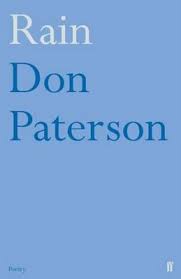Don Paterson
A review in the Weekend Australian of Don Paterson’s new collection of poems (written by Robert Gray) has drawn me back to his earlier works, in particular the afterword for his translations of the Sonnets of Orpheus by Rainer Maria Rilke, simply called Orpheus.Probably I should be talking about the poems but it is the Afterword which in this case most grabs me. Paterson finds himself ‘dismayed to discover the Sonnet’s recent recruitment to the cause of “spiritual literature”’. He believes that the Sonnets are ‘a strongly non-religious work, and easily capable of an anti-religious interpretation.’Casually reading the slim volume late at night in my bed I stumble upon this paragraph:
‘The two principal religious errors seem to me beautifully refuted in the Sonnets. The first is to think of truth as being in the possession of an inscrutable third party, whose knowledge and intentions can only be divined. However, we are all the thinking that matter is doing in this part of the universe. If the universe has an eye, it sees only through the eyes on this Earth and elsewhere; if a mind it thinks only in these minds …
‘The second error is to think of an afterlife or any reincarnation we are bound for as more extraordinary than finding ourselves here in the first place. This projection of ourselves into a future beyond our deaths warps our actions in, and therefore our sense of responsibility to, the here and now – as well as our negotiations with the real beings with whom we share and to whom we will bequeath a home … This, in a perfectly straightforward sense, is already life after death, as remarkably so as any “you” you might wake as in the future. Factor out the illusion of the unitary self – being a phantom centre created by an evolutionary necessity – and its back-formations of ego and soul, and being here once is the identically equivalent miracle to being here again.’
Suddenly I’m sitting up, wide awake. What Paterson articulates so concisely is something I encounter every time my mind comes awake for long enough to notice where it is I am: that this is all there is, here, in this moment. That this person I’m with, this weather we’re having, this room we’re in, or this mountain that we’re on, is, in fact, the moment, for all its unsatisfactoriness, equal in intensity and possibility to every other moment. The quality of attention which I bring to where I am is the governing factor controlling how important it is, not some external force.It shouldn’t, I guess, surprise me to find such acuity in Paterson. He is the poet who, apart from writing his own poems, also translated the poetry of the Spaniard Antonio Machado, producing the book The Eyes.In the Afterword to that collection, speaking of translation, he wrote:
‘These poems are versions, not translations. A reader looking for an accurate translation of Antonio Merchado’s words, then, should stop here and go out and buy another book – probably Alan Trueblood’s Antonio Machado: Selected Poems, which although it isn’t poetry, at least gives a more reliable reflection of the surface of Machado’s verse. Poems, though, are considerably more than the agglomerated meaning of their words, and in writing these versions I initially tried to be true to a poem’s argument and to its vision … This quickly became the more familiar project of trying to make a musical and argumentative unity of the material at hand, and this consideration, in overriding all others, led to mangling, shifts of emphasis, omission, deliberate mistranslantion, the conflation of different poems, the insertion of whole new lines and on a few occasions the writing of entirely new poems. In the end it became about nothing more than a commitment to a process – what Machado everywhere refers to as “the road”’.
I must off to the bookstore to buy this new collection, entitled Rain. Gray quotes several of the poems in his review. This one caught my attention, from ‘Phantom’:
We come from nothing and return to it.
It lends us out to time, and when we lie
in silent contemplation of the void
they say we feel it contemplating us.
This is wrong, but who could bear the truth.
We are ourselves the void in contemplation.
We are its only nerve and hand and eye.
There is something vast and distant and enthroned
with which you are one and continuous,
staring through your mind, staring and staring
like a black sun, constant, silent, radiant
with neither love nor hate nor apathy
as we have no human name for its regard
